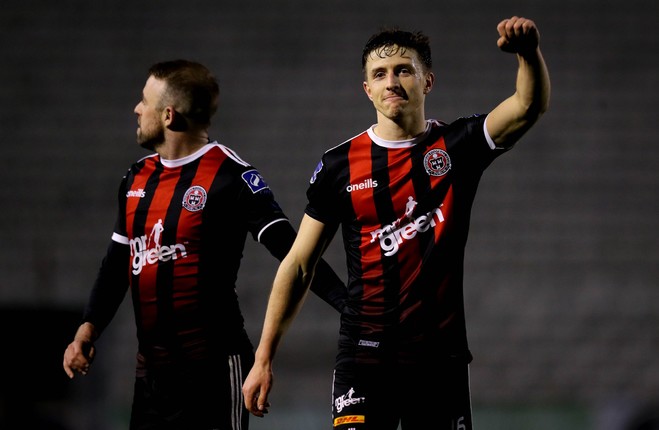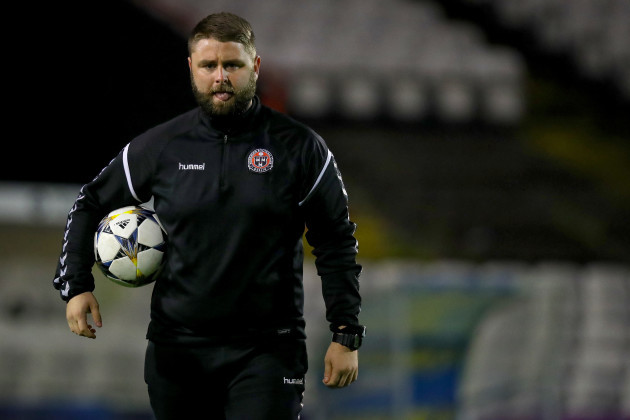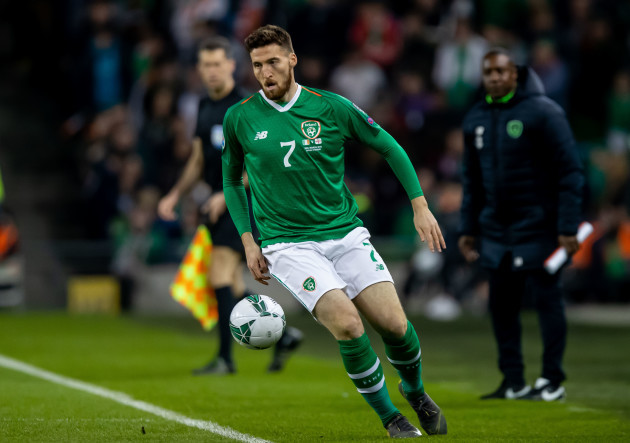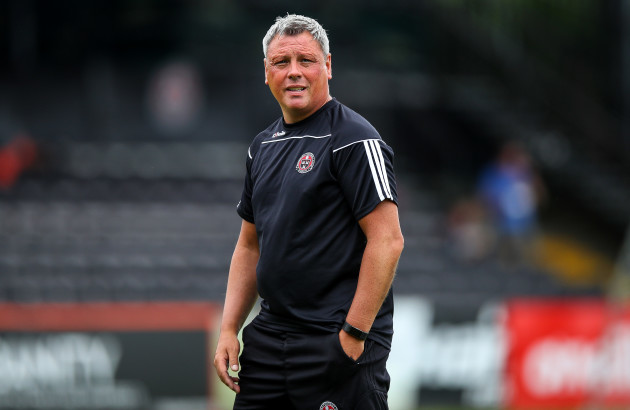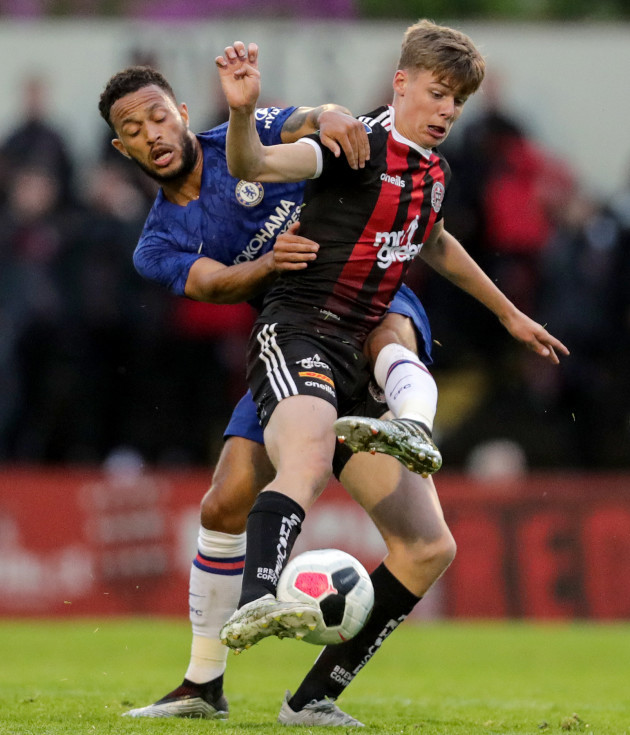IT IS “DEFINITELY” Bohemians’ biggest game of the season so far, Keith Buckley acknowledges.
Tonight, they host their bitter rivals Shamrock Rovers with a place in November’s FAI Cup final up for grabs.
It is not an easy game to predict. In terms of the league table, Shamrock Rovers have the upperhand. The Hoops currently sit second — where they are guaranteed to finish after Monday’s disappointing loss to newly crowned champions, Dundalk. Bohs are third, 15 points behind Stephen Bradley’s men, and they still have a fight on their hands to consolidate that position and in the process secure European football. Derry and St Pat’s both trail them by just two points, while the Candystripes have a game in hand.
Nevertheless, prior to the side’s most recent meeting, Bohs were unbeaten in the last 10 encounters between the teams, including a run of seven wins out of eight. Rovers finally managed to end that hoodoo at Tallaght Stadium last month, though whether they can repeat that feat at Dalymount Park tonight is far from certain.
“Most derbies you always look forward to. They’re always tense games and there’s a great atmosphere at all of them,” Buckley, who himself is a doubt for the match with a hamstring injury, tells The42.
What happened the last six or seven games is gone. They beat us in the last game. We’ve a good record [against Rovers] in Dalymount, but they’ve been close games. It’s not as if we ran away with games in Dalymount. We’ve got the wins, which is good. This cup game is a one-off. What’s at stake is completely different to a league game. It’s going to be so intense. I can’t wait to be involved, hopefully I play in it.”
Whatever happens tomorrow, it will be the first time the final isn’t Dundalk versus Cork City since 2014, after the Leesiders were stunned by Galway in the second round. The Lilywhites could yet retain the trophy though, as they face Sligo in the other semi-final on Sunday.
Bohs themselves already know how it feels to come tantalisingly close to a final. They looked on course for the Aviva last year. Dinny Corcoran put them 1-0 up in the semi against Cork, before a controversial penalty award saw Kieran Sadlier equalise three minutes from time and set up a replay, which their opponents won 2-1.
“I’ve heard a lot of people say, ‘get to the final, get to the final’. But you want to win it, you don’t just get to the final. Obviously, it’ll be good if you’re involved in a final, a day like that. 2008 was the last time we were in the final, when we won the double. For me personally, that was one of the goals [when I joined the club]. When you think of getting to the final and stuff, which is only a stone’s throw from my house, you always look at that.”
Moreover, reaching the showpiece event would be further evidence of the considerable progress made by Bohs both on and off the field in recent years.
“I’ve been at the club when they were in sticky areas with the money situation. The way it’s turned around, it’s amazing. It’s a credit to the whole club and the people who help run the club. It’s completely different the last couple of years.”
It has been quite a journey for Buckley from a person perspective too. As a schoolboy, there were significant doubts as to whether he would have a future in the game, let alone become a player who would register over 200 League of Ireland appearances. The Dubliner started out with local team Pearse Rangers. Then, at 15, he went for a trial at renowned schoolboy club Belvedere FC, which has produced countless footballers, including a number of Ireland internationals.
“I wasn’t going to make it,” Buckley recalls. “They pulled me aside. They were maybe five leagues ahead [of Pearse]. They said would you be interested in going to a team in the A or the Major. [They said:] ‘We don’t think you’re ready to make the jump within the first year. So maybe go out and get a bit of experience at that level.’
“I knew what I was getting into, I knew the quality of players. At that time, you had Sean Skelly, Craig Sexton in goal, Matt Doherty, Danny Joyce. A lot of them were underage internationals, and I knew from the coaches as well and I knew myself I wasn’t going to be playing a lot of games.
But I knew I would get better playing with better players and coming into better training facilities. The coaches were better than what I had, it was completely different. So I knew if I stuck it out for a year, and learned and put the effort in, hopefully then [I’d be ready] for the next year. And that’s what I did. I didn’t play many games at all that year and I was contemplating: ‘What will I do?’ Luckily enough, a couple of lads went away. And I took my chance when I got in.”
Buckley’s route into the League of Ireland highlights how players tend to develop at different rates — those who excel in their mid-teens are not necessarily destined for a career in the game, and vice versa. His progress was more gradual, compared with others.
“Definitely. What was a great help also, I think it was U17s, I was put in the FAI programme down in Ringsend. You’re training in the daytime and you’re also training with your club two or three nights a week.
“That helped me in trying to understand the game. You don’t just go training — it helped me technically as well to come on a small bit. So that was a huge one and that year, we won the treble. Because I was training five or six times a week, I felt like I was full-time. I felt I was fitter than a lot of others going into games. And it obviously paid off.”
Buckley came from a football family — both his mother and father played the game.
“My dad played when he was young. Then he had to give it up, he had a bad crash when he was 15, so he couldn’t play,” he adds.
His brother played locally too, while Buckley was also a keen GAA player — featuring on the same team as current Dundalk star Sean Gannon — before giving it up to focus on soccer around the age of 16.
“I knew my size was never going to suit GAA,” he says.
After two and a half years with Belvedere, Buckley joined Bohs after scoring four goals in a comprehensive win over their underage side. Initially, the plan was to ease him into the first team over a two or three-year period. Ultimately though, he ended up making his debut for the senior side at 18, less than a year after joining.
“In training, every single day counts. I learned that from training with great players coming through. And when I played, I played in the wrong position for a number of years. I would have liked to have played midfield since I was young, because that’s where I naturally play, but [playing out of position] probably helped me understand the game a bit more.”
The turbulent nature of the League of Ireland means stability is relatively rare, but Buckley is an anomaly. Last June, it was confirmed that he had extended his contract with the club until the end of the 2020 season. It will mean he has represented the Dalymount Park outfit for over a decade and spent his entire League of Ireland career there with the exception of a single campaign lining out for Bray Wanderers in 2017.
“I don’t like talking too much about that, but it was a difficult decision. It’s one of them you regret,” he says of the Bray move. His spell at the Carlisle Grounds began encouragingly, as the club rose towards the top of the table, before the scale of their financial problems became apparent and all their progress was soon undone.
During the break of that year [2017], I contacted Keith to see if we could get [a move] done. For one reason or another, it just couldn’t happen. I signed a two-year contract [with Bray]. Luckily enough, I could get out and leave that, and then go back to Bohs, because everybody wanted to do that. I left in the middle of my contract. I could have sat there. But you go where you’re happy. There’s no point playing somewhere where you’re not happy. And I did feel like that. I made a mistake. You always look back at things and wonder: ‘Is the grass always greener [on the other side]?’ And I wondered that myself.”
At the time of his return, Buckley added: “The moment of realisation for me was going to see Bohs play Dundalk midweek last year.
“Seeing all the fans and the reception I got, seeing legends like Turlough O’Connor in the Jameson Bar and staff like Lynn O’Neill around the place, I realised there was no other place I wanted to be.”
The influence of manager Keith Long was another significant factor in his return.
“I’ve probably played in 90% of games since Keith’s been there. When I left [for Bray], I thanked him for what he did. He texted me and said: ‘No, you’ve done it yourself, I was just there to be your pedestal.’
“When I was young, he was so helpful. He’d lead people in all sorts of areas. He understands, you can talk about anything, off-the-field stuff, personal stuff.
“Then there’s his knowledge of the game — he’d tell you how he wants you to prepare and play every training session. And how you apply yourself — hard work and honesty is a part of this club. He wants you to bring it to every game and every training session. That’s driven by him and [assistant boss] Trevor Croly, and it filters down through the team.”
Along with captain Derek Pender, Buckley is now a stalwart in a side that is otherwise filled with a number of promising youngsters. Though still only 27 himself, is he starting to feel like an elder statesman given the contingent of teenagers in and around the first team?
I didn’t until [14-year-old] Evan Ferguson came on against Derry and I just said: ‘I’m almost twice his age.’ At 14 years of age, I was just coming in from school, going down and playing local matches. You see a lot of young lads coming through and we have a good system with Sexto [U19s boss Craig Sexton]. I obviously played with him a couple of years at Belvedere. He was captain and I knew he was going to be a coach, the way he spoke about the game and the way he saw it. He’s been brilliant.
“It’s crazy how many young lads there are. That’s why I always say — every time Keith is questioned and brings in these young lads, he somehow pulls it off every time. If these young lads leave and they’re able to get in an experienced player [it would be easier], but the situation we are in and with the resources, we have to take in young lads. You know he’s watched them through the years and he has a good eye for them.
“It’s probably one of the best places to be for a young lad. You’ve Evan at 14 years of age, Ross Tierney at 18.
“Bohs are chasing Europe and these young lads are getting to play. I don’t know if they even have the awareness of how big the game they’re playing in is. We’re third in the table and the amount of young lads coming through for a team third in the table is crazy. I don’t know how many young lads come through in the starting XI for Rovers or Dundalk. I don’t think a lot come through compared with Bohs.”
On the precocious Ferguson he adds: “If you played in training and didn’t know nothing about anybody, you would not say ‘that lad is 14’. Physically, he’s maybe six foot. He’s bigger than the majority of us. And he’s very clever for his age. His passing and stuff, you can see it in him and you’d be questioning how at that age, he has that brain. I know there are a lot of questions over it, but when you see the physical stature of him, you wouldn’t think he’s 14.”
And whatever the result this evening, 2019 will surely be looked back upon as a positive season for Bohs regardless, particularly if they can wrap up third place, when you consider that they are often competing against fully professional players.
A few of us do work on the side — some part-time and full-time,” he explains. “You get used to it. I’m working since I was 18, so with the games the last couple of years, in the gap between April and May where there’s a crazy amount of games, that can be very tough. That’s when it’s very tough, getting up on Monday nights, up the next day early and training the next day. That’s when it affects [you], because if you work all week and you have a match on a Friday, you can rest on the weekend. But the midweek games are the problem. They’re hard to recover from. By the time you get home from let’s say Derry, you’re probably only getting four hours sleep [before work]. Then you have to train the next day. And sleep is such a huge part of recovery nowadays.”
FAI Cup semi-finals:
Premier Division:
The42 is on Instagram! Tap the button below on your phone to follow us!
